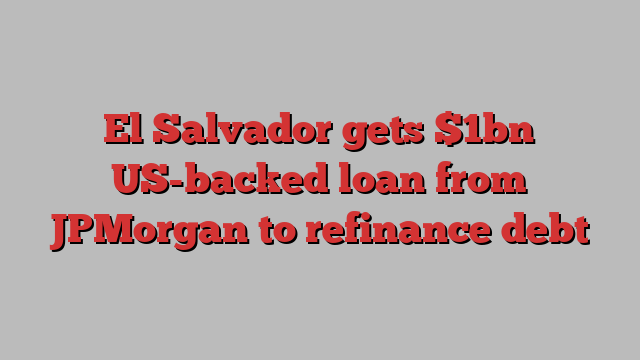
Unlock the Editor’s Digest for free
Roula Khalaf, Editor of the FT, selects her favourite stories in this weekly newsletter.
El Salvador has refinanced $1bn of its debt with a US government-backed loan from JPMorgan Chase linked to promises of river conservation, as President Nayib Bukele seeks to put the country on a stronger economic footing.
The Central American nation said on Thursday that it would use the $1bn loan to buy back bonds and use $350mn in savings on debt service to fund the restoration of one of the region’s longest rivers.
“This debt conversion represents the most ambitious and impactful environmental action in El Salvador’s history,” said Bukele.
The interest rate on the loan from JPMorgan was not disclosed, but it will be subsidised with political risk insurance from the US Development Finance Corporation, the latest sign of Washington’s shift towards support for Bukele after years of criticism of his democratic backsliding.
The El Salvador deal also reflects the proliferation of so-called debt-for-nature swaps in the market for lending to poor countries, with banks rushing to fund a pipeline of transactions across Latin America, the Caribbean and Africa.
Many governments are attracted to the swaps because they are otherwise locked out of normal bond market borrowing by punishingly high interest rates, and can use development-bank guarantees to retire debt in return for conservation commitments.
But the deals are facing questions over their transparency and whether countries are really receiving sustainable debt relief.
Last year, Ecuador made a landmark swap deal to fund conservation in the Galápagos Islands, but local community groups have complained about a lack of consultation.
Bank of America arranged Africa’s first debt-for-nature swap last year for Gabon. The so-called blue bond linked to ocean conservation also lowered rates using US political risk insurance, despite a coup weeks after it was issued.
Bukele, a wildly popular authoritarian who has referred to himself as “the world’s coolest dictator”, has shaken up politics in El Salvador since 2019.
His draconian policies to lock up 2 per cent of the adult population have vastly improved security in the nation previously plagued by gang control.
That change earned him admirers across the region and some of the highest domestic approval ratings for any leader. His adoption of bitcoin as legal tender was more controversial and largely failed to promote widespread adoption or financial inclusion.
Bukele ran for re-election after a court he installed reinterpreted a long-held constitutional ban on consecutive terms. But after initial criticism, the US DFC’s support for this week’s deal is symptomatic of the rapid shift in international government policy towards El Salvador, which has historically been a major source of northbound migration.
During his second term, which began in June, Bukele has focused on bringing down government spending and debt, which had been growing. Earlier this year, he said government current expenditure in the 2025 budget would be financed without any new debt.
“Our next goal is that the world looks to El Salvador more for its economic miracle than its security miracle,” Bukele wrote on X. “It will take a few years but we’re on the right path.”
El Salvador has been in talks with the IMF for more than a year about a new loan facility, but the fund has made it clear that the country would have to change its bitcoin law.
“IMF staff have an ongoing engagement with the Salvadoran authorities.” the fund said last week. “Addressing risks arising from bitcoin is a key element of these discussions.”